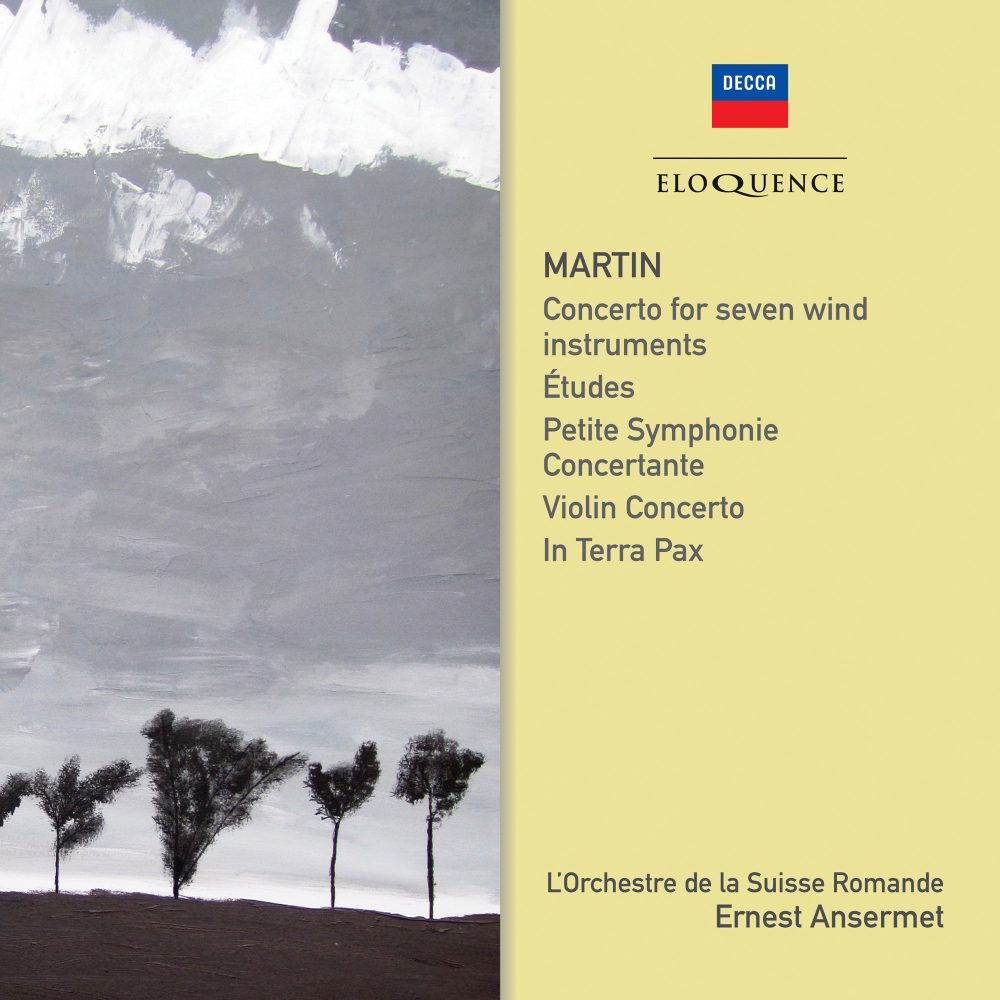Ernest Ansermet’s complete Decca recordings of Frank Martin.
The Swiss conductor regarded his countryman, Frank Martin as one of the two great composers of his time. He rejected the atonal system of music as ‘without musical meaning’ and even, late in life, turned against Igor Stravinsky whom he had championed earlier in his career. In a 1962 interview, he claimed that only Martin and Benjamin Britten were composing masterpieces: they ‘do as well as they can in a troubled historical situation’.
Ansermet was true to his word in both performing and recording the major works of Martin. On CD1 of this anthology are authoritative, superbly animated accounts of the composer’s neo-classically structured instrumental masterpieces, the Petite symphonie concertante and the Concerto for seven wind instruments, timpani, percussion and string orchestra, as well as the less-often heard Études for string orchestra. CD2 opens with the Violin Concerto which Martin dedicated to the soloist on this recording, Wolfgang Schneiderhan, and the set is completed with Martin’s wartime oratorio In terra pax.
Ansermet gave the first performance of the oratorio in 1945 and he remains the most powerful advocate on record of this yearning plea for peace in desperately troubled times. This music was, in the words of the conductor, ‘the expression of a faith; not because Martin set religious texts, among other things, to music – one can also do that without faith and conversely, faith can be expressed in a fugue – but because if an impetus goes beyond simple symmetry, if it expands and acquires a new momentum, it is because it is supported by a faith – and this is how Frank Martin’s music behaves all the time, just like the music of Bach and Handel.’
FRANK MARTIN
CD 1
Concerto for seven wind instruments, timpani, percussion & string orchestra
Études for string orchestra
Petite Symphonie Concertante
Pierre Jamet, harp
Doris Rossiaud, piano
Germaine Vaucher-Clerc, harpsichord
CD 2
Violin Concerto
Wolfgang Schneiderhan, violin
In Terra Pax
Ursula Buckel, soprano
Marga Höffgen, contralto
Ernst Haefliger, tenor
Pierre Mollet, baritone
Jakob Stämpfli, bass
L’Union Chorale de la Tour de Peilz
Chœur des Dames de Lausanne
Robert Mermoud, chorus master
L’Orchestre de la Suisse Romande
Ernest Ansermet
Recording Producers: Michael Bremner, Erik Smith (Concerto for seven wind instruments, Études); Victor Olof (Petite Symphonie Concertante); Victor Olof, James Walker (Violin Concerto); Michael Bremner (In Terra Pax)
Balance Engineers: Roy Wallace (Concerto for seven wind instruments, Études); Arthur Haddy (Petite Symphonie Concertante); Gil Went, Roy Wallace (Violin Concerto); James Lock (In Terra Pax)
Recording Location: Victoria Hall, Geneva, Switzerland, March 1951 (Petite Symphonie Concertante), 9–11 May 1955 (Violin Concerto), 30 September–15 November 1961 (Concerto for seven wind instruments, Études), September–October 1963 (In Terra Pax)
Original Decca LP Releases: SXL 2311 (Concerto for seven wind instruments, Études); LXT 2631 (Petite Symphonie Concertante); LX 3146 (Violin Concerto); SXL 6098 (In Terra Pax)
Eloquence Series Producer: Cyrus Meher-Homji
‘An extraordinarily fine performance. Ansermet is just the man for a composition like this which is at once intellectually conceived yet capable of yielding attractive sensuous effects … Schneiderhan brings a fine combination of ardour and discipline to his contribution. The balance is flawless, and the recording first-rate’ Gramophone (Violin Concerto)
‘Ansermet’s massed strings evoke an effect of controlled yet almost frightening power.’ High Fidelity (Etudes)
‘The third section […] is particularly magnificent, thanks in no small part to Marga Höffgen’s superlative singing; but all the parts are beautifully sung and played, and the recording engineers have taken their roles accordingly.’ High Fidelity (In terra pax)




